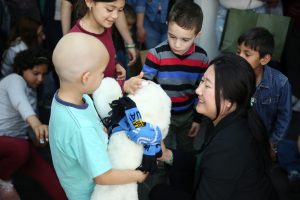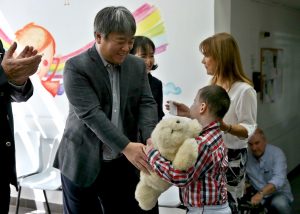
Montevideo, Nov 7 (EFE).- Children suffering from cancer and being treated at the Perez Scremini Foundation in Montevideo will have a new companion, a robot seal named PARO who, according to its creator, Japan’s Takanori Shibata, will help kids alleviate the pain of their treatment.
Shibata, a professor at the National Institute of Advanced Industrial Science and Technology (AISI), told EFE on Thursday, upon the delivery of the robot that he has donated to the medical center, that he created PARO because of his interest in developing a personal robot that would provide day-to-day help to people.
Along those lines, in thinking about what things people might need help with that robots could do instead, like cooking and cleaning, the professor thought about pets that, he said, provide psychological, physiological and social benefits to humans as companions.
“The interaction with animals makes people happy and motivates them. In the physiological area, this reduces stress and is a good portion of rehabilitation, and the social benefit it has is that it connects people (with something) and promotes communication,” he said.
Given that animals often are not allowed in hospitals or nursing homes due to allergies some people have or fear of being scratched or bitten, Shibata decided to create a robot that could fulfill that role and help people get through difficult times.

The professor, who in 2018 traveled to various hospitals in Uruguay with the Japanese ambassador to the South American country, Tastuhiro Shindo, said that the donation of PARO to the Foundation – the only one in Uruguay devoted to treating cancer in children and having a cure rate of 80 percent – will help alleviate the secondary effects of treatment such as chemotherapy.
“Since PARO has no secondary effect, chemotherapy can be combined with interacting with him. So, here we’re hoping that PARO will be used by kids before treatment to reduce anxiety and pain,” he said.
The Japanese expert emphasized that the plush and friendly-looking robot, which has been used in more than 30 countries so far and costs about $6,000, has many kinds of sensors and can learn people’s names, among other intelligent functions.
“His entire body is covered with tactile sensors. He had three microphones for voice recognition and sound localization, so he recognizes some words and if you speak he detects the direction of the sound. He also has temperature control … and artificial intelligence, so that he can (adjust) his behavior autonomously,” Shibata said.
Meanwhile, Horacio Fernandez Ameglio, the president of the Perez Scremini Foundation, hailed the donation and said that PARO will be a new friend for the kids at the center.
“He has a technology that allows him to recognize the child, recognize the voice, stimulate him … They can play with him, tell him their problems, their pains … He doesn’t talk but he certainly transmits sensations and, above all, friendship, which is very important for kids who are suffering,” he said.
